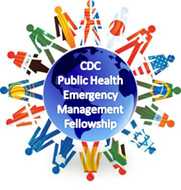CDC Emergency Operations Center: Public Health Emergency Management Fellowship

CDC’s Public Health Emergency Management (PHEM) Fellowship invites international public health experts to train at the CDC in Atlanta, GA, for four months in order to gain an understanding of public health emergency management principles and the functions that support an Emergency Operations Center.
Fellows receive specialized training in public health emergency management functions and operations, participate in site visits, take part in public health exercises and responses, and are exposed to federal, state, and local emergency management specialists.
Trained experts who know what to do are critical to building a functioning EOC; more valuable than state-of-the art equipment or supplies is the knowledge emergency management experts can bring to the table. When every second counts, understanding how to coordinate an effective response can save lives.
PHEM and Global Health Security
“[During my fellowship], I had a lot of questions. They helped me to improve my perception of public health emergency management in my country.” – 2016 PHEM Fellow
Monitoring and responding to public health events through an Emergency Operations Center is a cornerstone of both the International Health Regulations (IHR) and the Global Health Security Agenda (GHSA). These two international agreements are key to the world’s effort to better prevent, detect, and respond to public health threats. Having an Emergency Operations Center that can respond within two hours of an emergency is one of the stated goals of the GHSA.
The Public Health Emergency Management (PHEM) Fellowship is designed to build public health emergency management capacity among members of the international public health community who work in preparedness and response in countries that have signed on to these international agreements.
Our Program
The goals of the Public Health Emergency Management Fellowship Program are to:
- Provide in-depth exposure to public health emergency management frameworks, functions, staff, and program elements.
- Provide in-depth exposure to the functioning of a Public Health Emergency Operations Center (PHEOC).
“ It is a very great program. It has helped me to be more open-minded about public health in general.” – 2016 PHEM Fellow
By the end of the fellowship, Fellows will understand public health emergency management principles and gain a working knowledge of the functioning of an emergency operations center. Furthermore, they will be able to demonstrate the following skills:
- Collect, analyze, and disseminate critical public health information
- Manage an emergency situation effectively
- Have an understanding of emergency operation centers operations, organizational structure, staffing, and schedules
- Interact with staff responsible for carrying out emergency management
- Train relevant professional staff members in their home country
Our Fellows
Since the 2013 inaugural class, CDC has hosted 39 fellows from 25 countries. Fellows come from diverse cultural and career backgrounds. Fellows must be willing to commit to the four-month program, demonstrate English proficiency, and achieve the necessary CDC security clearance.
PHEM Fellows usually:
- Hold a Master’s degree, doctorate or equivalent in public health, epidemiology or a related field
- Have a level of responsibility within their Ministry of Health that reflects leadership of a public health emergency management function and requires coordination with other emergency management functions
- Have a position, or are expected to have a position, that will support their training or influence others upon return to the home country
Fellows come from various positions within Ministries of Health. Roles fellows have held prior to joining the Fellowship include:
“I am currently deployed as head of the emergency preparedness and response unit and am depending greatly on my training while at CDC to train my colleagues [at home] on the job.” – 2013 PHEM Fellow
- Epidemiology/Surveillance (41%)
- Emergency Preparedness and Response (36%)
- Medicine / Community Health (13%)
- Infectious Disease Preparedness (7%)
- Information Management and Technology (3%)
Post-Fellowship Experiences
Upon completion of PHEMF, Fellows are asked to apply their learning to develop a personal toolkit: a series of papers, recommendations or projects that can be shared with colleagues in their countries on their return.
Fellows facilitate the expansion of public health emergency management within their countries and have returned to their home countries to assume key roles in public health. Examples of roles fellows have taken on after their training include:
- Director of the Public Health Emergency Center in the China CDC
- Director of the Disaster Risk Management Unit in the Kenya Ministry of Health
- Strategic Health Operations Centre Officer-in-Charge in India’s National Centre for Disease Control
- EOC Manager in the Thailand Ministry of Public Health Department of Disease Control
Why CDC?
“I stay connected with CDC staff when I have a concern and they give me advice. In the process, I improve my skills and my knowledge about global health.” – 2016 PHEM Fellow
Several factors uniquely position CDC to offer the Public Health Emergency Management Fellowship.
CDC has a more than 60 year history of using evidence-based science to drive public health decision making. Over the last 10 years, response at CDC has evolved into a robust emergency management program. As of today, CDC is the only federal agency with an emergency management program accredited by the Emergency Management Accreditation Program (EMAP).
For over a decade, CDC’s Global Disease Detection (GDD) program has been working with ministries of health around the world to building public health capacity. Through this work, countries have become familiar with CDC’s work in emergency response and its accredited emergency management program.
CDC’s extensive global health security work has fostered trust and connection with ministries of health across the globe. Fellows are nominated by ministries of health primarily from countries where GDD operates and from countries that are currently partnering with CDC to reach the goals of the Global Health Security Agenda.
- Page last reviewed: August 26, 2016
- Page last updated: August 26, 2016
- Content source:


 ShareCompartir
ShareCompartir